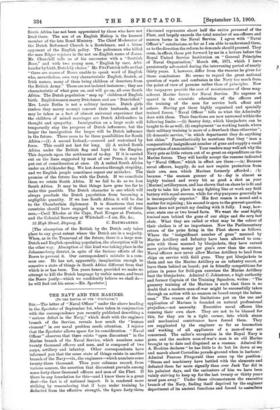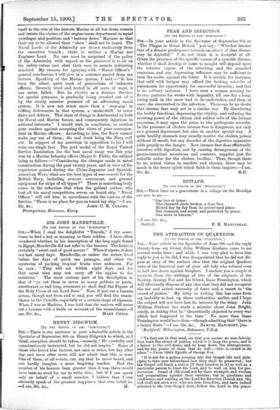THE NAVY AND THE MARINES.
[TO THE EDITOR OF TEE " SPECTATOR."]
Six,—The letter of "Naval Officer" under the above heading in the Spectator of September 1st, when taken in conjunction with the correspondence you recently published describing a " serious defect in the Navy," which dealt with the engineer branch of the Service, reveals how much the " human element" in our naval problem needs attention. I rejoice that the Spectator allows space for its consideration. " Naval Officer " observes that there exists " open discontent " in the Marine branch of the Naval Service, which numbers some twenty thousand officers and men, and is composed of two corps, artillery and infantry. Other correspondents have informed you that the same state of things exists in another branch of the Navy—viz., the engineers—which numbers some twenty-three thousand. Thus your columns record, from various sources, the assertion that discontent prevails among some forty-three thousand officers and men of the Fleet. If there be any foundation for this—and I know there is a great deal—the fact is of national import. It is rendered more striking by remembering that if boys under training be deducted from the effective strength, the figure forty-three thousand represents about half the entire personnel of the Fleet, and largely exceeds the total number of sea-officers and seamen borne in the Naval Service. I agree with " Naval Officer's" conclusions, so far as I am able to understand them, as to the direction the reform he demands should proceed. They seem, in effect, those put forward by me in a lecture before the Royal United Service Institution on " General Principles of Naval Organisation," March 61*b, 1871, which I have persistently advocated during the intervening period of nearly thirty years. I, however, differ from the reasons he gives for those conclusions. He seems to regard the great national question of waste and confusion in the Navy too much from the point of view of persons rather than of principles. Now the taxpayers provide the cost of maintenance of these mag- nificent Marine forces for Naval Service. No expense is spared in the scientific education of the officers and the training of the men for service both afloat and ashore. Having got these highly organised and specially trained forces, " Naval Officer " tells us what the Admiralty does with them. Their functions are now narrowed within the following limits :—(1) Sentry duty, which bluejackets can be taught to do as well; (2) employment "as working hands, where their military training is more of a drawback than otherwise "; (3) domestic service, " in which department they do anything but shine." Parenthetically he mentions that they " man a comparatively insignificant number of guns and supply a small proportion of ammunition." Your readers may well ask why the Navy gets so little return out of so great an expenditure on the Marine forces. They will hardly accept the reasons indicated by " Naval Officer," which in effect are these :—(a) Because naval officers, happily, do not now require protection from their own men which Marines formerly afforded ; (b) because " the seaman gunner of to - day is almost as highly trained and every bit as good a shot as your [Marine] artilleryman, and has shown that on shore he is fit and ready to take his place in any fighting line or work any field battery with equal success, while for ship purposes generally he is incomparably superior." His first reason is sound and a matter for rejoicing ; his second is open to the gravest question. Space does not permit my dealing with it fully. I may, how- ever, state one or two broad facts. We want the most highly trained men behind the guns of our ships and the very best shots. What they are called or what may be the colour of their clothes is of no importance. Now the Parliamentary return of the prize firing in the Fleet shows as follows. Where the " insignificant number of guns " manned by Marine Artillery and Infantry have been allowed to com- pete with those manned by bluejackets, they have earned more prize-firing money per gun's crew than the seamen. Naval officers now never allow Marine Artillery to land from ships on service with field guns. They put bluejackets to them and use the Marine Artillery as an infantry escort, or leave them behind on board; yet in friendly competitions for prizes in peace for field-gun exercises the Marine Artillery beat the bluejackets. Admiral C. Johnstone, a high authority and former Captain of the Training Squadron, writes : " The gunnery training of the Marines is such that there is no doubt that a modern man-of-war might be successfully taken through an action with no seamen on board except the helms- man." The reason of the limitations put on the use and application of Marines is founded on natural professional prejudice,—not necessity. Executive naval officers like running their own show. They are not to be blamed for this, for they are in a tight corner, into which steam and mechanical contrivance have forced them. They are supplanted by the engineer so far as locomotion and' working of all appliances of a man-of-war are concerned. The sailor's occupation in the Royal Navy is gone, and the modern man-of-war's man is an old Marine brought up to date and disguised as a seaman. Admiral Sir A. Hoskins declares " he has little to do but lie down at sea and march about Corradino parade-ground when in harbour?' Admiral Penrose Fitzgerald thus sums up the position : " Steam and machinery have battled with the elements and defeated them far more signally than ever Jack Tar did in his palmiest days, and the caricature of him we have been vainly striving to keep up for the fast twenty or thirty years must pass away." Under these circumstances the executive branch of the Navy, finding itself deprived by the engineer department of its ancient functions and forced to assimilate
itself to the role of the historic Marine in all but dress, resents and resists the claims of the engine-room department to equal privileges and position, and " battens down " Marines so that their cry to be allowed their " show " shall not be heard. The Naval Lords of the Admiralty are drawn exclusively from the executive branch ; there is neither a Marine nor Engineer Lord. No one need be surprised if the policy of the Admiralty with regard to the personnel is to sit on the safety-valves and shut their ears to sounds indicating mischief. My reasons for agreeing with " Naval Officer's " general conclusions I will give in a sentence quoted from my lecture. Speaking of the Marine system, I said :—" It has been the silent, quiet work of generations of unknown officers. Severely tried and tested in all sorts of ways, it has never failed. But its vitality as a distinct Service, for special purposes, is gradually being crushed out of it by the steady exterior pressure of an advancing naval system. It is now not much more than a stop-gap' in trifling deficiencies in that system, a `make-shift' to cover flaws and defects. This state of things is detrimental to both the Naval and Marine forces, and consequently injurious to national interests." I would wish, in conclusion, to caution your readers against accepting the views of your correspon- dent on Marine officers. According to him, the Navy cannot make any use of them ; the real truth being the Navy will not. In support of my assertion in opposition to his I will state one single fact. The gold medal of the Royal United Service Institution for the best naval essay was this year won by a Marine Infantry officer (Major C. Field), the subject being as follows :—" Considering the changes made in naval construction during the past twenty years, and in view of the experience gained during the Chino-Japanese and Spanish. American Wars, what are the best types of war-vessels for the British Navy, including armour, armament, and general equipment for ships of all types P" There is something truly comic in the reflection that when the gallant author, who beat all his naval competitors, serves on board ship, " Naval Officer" will tell him, in accordance with the custom of the Service, " There is no place for you on board my ship."—I am,







































 Previous page
Previous page